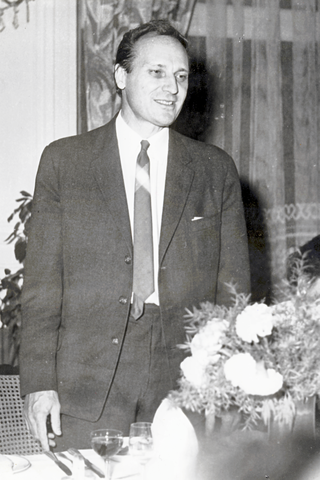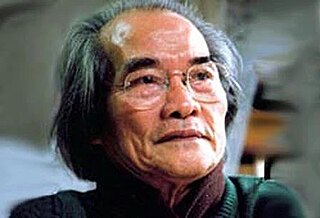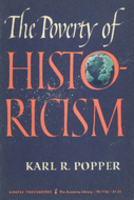
Evald Vassilievich Ilyenkov was a Russian Marxist author and Soviet philosopher.
Raya Dunayevskaya, later Rae Spiegel, also known by the pseudonym Freddie Forest, was the American founder of the philosophy of Marxist humanism in the United States. At one time Leon Trotsky's secretary, she later split with him and ultimately founded the organization News and Letters Committees and was its leader until her death.

Radovan Richta was a Czechoslovak philosopher who coined the term technological evolution; a theory about how societies diminish physical labour by increasing mental labour.
Lucien Goldmann was a French philosopher and sociologist of Jewish-Romanian origin. A professor at the EHESS in Paris, he was a Marxist theorist. His wife was sociologist Annie Goldmann.

Czech philosophy, has often eschewed "pure" speculative philosophy, emerging rather in the course of intellectual debates in the fields of education, art, literature, and especially politics. A source drawing from literature, however, distinguished the Czech national philosophy from the speculative tradition of German thought, citing that it emerged from folk wisdom and peasant reasoning.

Michael Löwy is a French-Brazilian Marxist sociologist and philosopher. He is emeritus research director in social sciences at the CNRS and lectures at the École des hautes études en sciences sociales. Author of books on Karl Marx, Che Guevara, Liberation Theology, György Lukács, Walter Benjamin, José Carlos Mariátegui, Lucien Goldmann and Franz Kafka, he received the CNRS Silver Medal in 1994.

Adolfo Sánchez Vázquez was a Spanish-born Mexican philosopher, writer and professor born in Algeciras, Andalucia.
The Praxis school was a Marxist humanist philosophical circle, whose members were influenced by Western Marxism. It originated in Zagreb in the SFR Yugoslavia, during the 1960s.

Trần Đức Thảo was a Vietnamese philosopher. His work attempted to unite phenomenology with Marxist philosophy. His work had some currency in France in the 1950s and 1960s, and was cited favorably by Jacques Derrida, Jean-François Lyotard and Louis Althusser.

Erazim Kohák was a Czech philosopher and writer. His early education was in Prague. After communists took over Czechoslovakia in 1948, his family escaped to the United States. He died in February 2020 at the age of 86.

The Poverty of Historicism is a 1944 book by the philosopher Karl Popper, in which the author argues that the idea of historicism is dangerous and bankrupt.
Ivan Sviták was a Czech philosopher, critic, and poet who ranked among Europe's most prominent proponents of Marxist humanism.
Marxist humanism is an international body of thought and political action rooted in a humanist interpretation of the works of Karl Marx. It is an investigation into "what human nature consists of and what sort of society would be most conducive to human thriving" from a critical perspective rooted in Marxist philosophy. Marxist humanists argue that Marx himself was concerned with investigating similar questions.
In Marxist philosophy, reification is the process by which human social relations are perceived as inherent attributes of the people involved in them, or attributes of some product of the relation, such as a traded commodity.
Marxist philosophy or Marxist theory are works in philosophy that are strongly influenced by Karl Marx's materialist approach to theory, or works written by Marxists. Marxist philosophy may be broadly divided into Western Marxism, which drew from various sources, and the official philosophy in the Soviet Union, which enforced a rigid reading of what Marx called dialectical materialism, in particular during the 1930s. Marxist philosophy is not a strictly defined sub-field of philosophy, because the diverse influence of Marxist theory has extended into fields as varied as aesthetics, ethics, ontology, epistemology, social philosophy, political philosophy, the philosophy of science, and the philosophy of history. The key characteristics of Marxism in philosophy are its materialism and its commitment to political practice as the end goal of all thought. The theory is also about the struggles of the proletariat and their reprimand of the bourgeoisie.

Michael Hauser is a Czech philosopher, translator and founder of the civic organization Socialist Circle, which he also chaired until 2014. He became a member of the Council of Česká televize in March 2014.
Dialectical materialism is a materialist theory based upon the writings of Karl Marx and Friedrich Engels that has found widespread applications in a variety of philosophical disciplines ranging from philosophy of history to philosophy of science. As a materialist philosophy, Marxist dialectics emphasizes the importance of real-world conditions and the presence of functional contradictions within and among social relations, which derive from, but are not limited to, the contradictions that occur in social class, labour economics, and socioeconomic interactions. Within Marxism, a contradiction is a relationship in which two forces oppose each other, leading to mutual development.
Western Marxism is a current of Marxist theory that arose from Western and Central Europe in the aftermath of the 1917 October Revolution in Russia and the ascent of Leninism. The term denotes a loose collection of theorists who advanced an interpretation of Marxism distinct from classical and Orthodox Marxism and the Marxism-Leninism of the Soviet Union.

History and Class Consciousness: Studies in Marxist Dialectics is a 1923 book by the Hungarian philosopher György Lukács, in which the author re-emphasizes the philosopher Georg Wilhelm Friedrich Hegel's influence on the philosopher Karl Marx, analyzes the concept of "class consciousness," and attempts a philosophical justification of Bolshevism.

The Counter-Revolution of Science: Studies on the Abuse of Reason is a 1952 book by Nobel laureate economist Friedrich Hayek. In it Hayek condemns the positivist view of the social sciences for what he sees as scientism, arguing that attempts to apply the methods of natural science to the study of social institutions necessarily overlook the dispersed knowledge of the individuals which compose those institutions.











